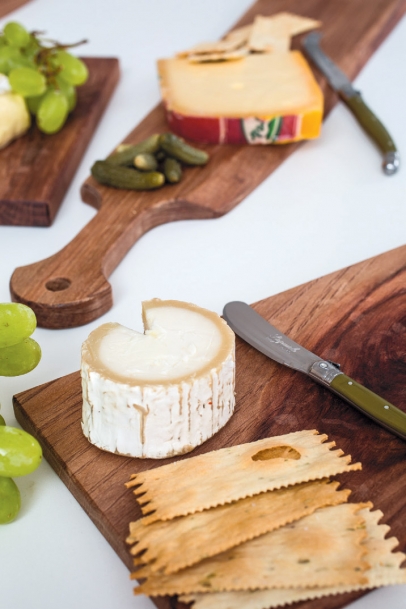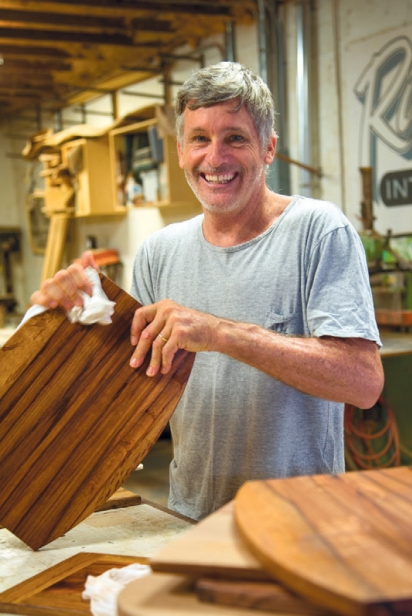Wood Street Studio
The concept for Dale Rieke’s beautifully crafted wooden cutting boards and cheese boards began as a simple solution to a practical problem.
“When you have a bucket full of beautiful wood and you’re paying to dump it,” says the 52-year-old Sarasota furniture maker, “that’s when [inspiration] kind of strikes you.”
The boards start as scrap wood from Rieke’s sawmill, where he takes locally sourced trees and readies them for his commissioned furniture projects. “We sawmill [the tree] into boards, and then it goes through a lengthy process of drying it through the kiln, and then processing the wood for finished cabinet material,” he says. “But then you have these scraps that are really pretty. We just couldn’t bear to throw them away. So that’s how the cutting boards and cheese boards came to life.”
Like his furniture, the boards are both artistic and functional—decorative kitchen wall hangings equally suited for serving hors d’oeuvres or slicing crudités.
All the materials are local. Southwest Florida’s temperate climate provides an astonishing array of hardwoods right in Rieke’s backyard, including maple, birch—even Australian pine, an invasive species that Rieke gets from a local arborist who otherwise would have to scrap the whole tree altogether.
“Just recently we recovered a 200-year-old pecan tree that was half a mile from us, a couple of monkey pod trees that were literally on the next block, and a rosewood tree that was maybe five miles away,” he says. Windfall from Hurricane Irma is finding new life in Rieke’s mill, and many storm-felled trees will eventually make their way to Southwest Florida kitchens and dining rooms.
Even in their earliest stages, the boards show off the wood grain’s natural artwork, each piece with its own unique signature of lines and whorls. “The trees don’t grow perfectly straight,” says Rieke. “The twisty-turny [pattern] adds a lot of character—perfect for what we’re using them for.”
The rough cuts are then shaped into rectangular boards with smooth, rounded corners. Finally, Rieke mixes and applies his own combination of paraffin wax and mineral oil, a concoction that enhances the striking appearance of the natural wood grain while also rendering the boards both durable and food-friendly.
Now celebrating his 30th year in the custom furniture business, Rieke has toyed with these sorts of boards for most of his career, making one or two pieces whenever he had spare time. This summer, he fulfilled his first bulk order: 30 boards for a part-time Sarasota resident who wants to sell them at her shop in Portland, Maine. Other potential customers can purchase boards (from $50 to $75) by contacting Rieke directly through his website.





